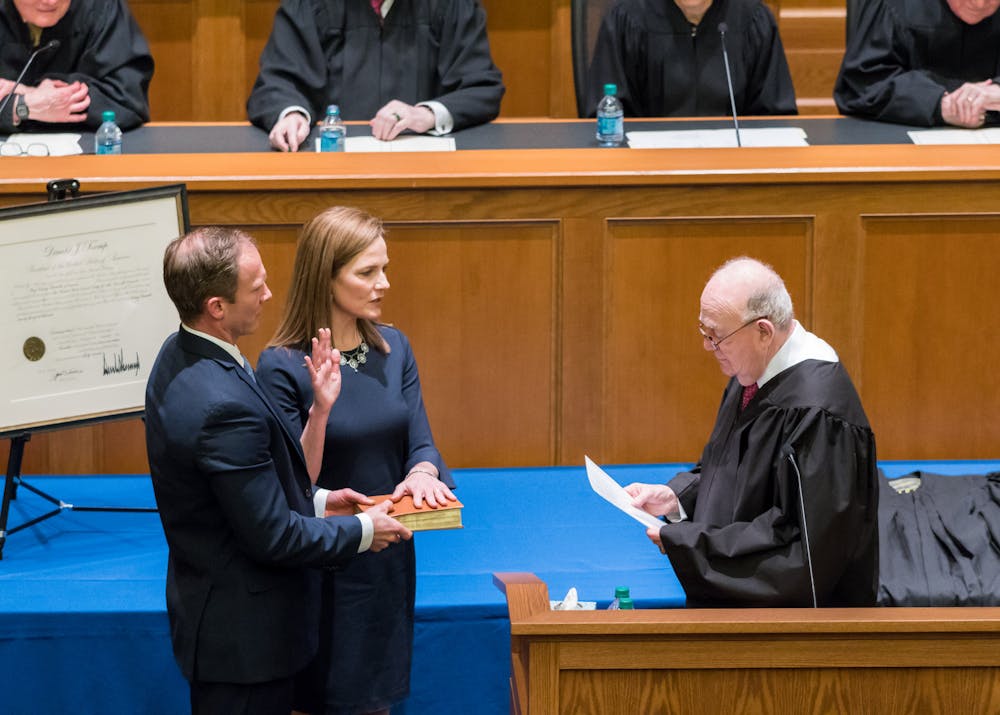At the end of her life, Justice Ruth Bader Ginsburg said: “My most fervent wish is that I will not be replaced until a new president is installed.” Less than six weeks later, Amy Coney Barrett — a hardcore conservative with only three years of judicial experience — has filled Ginsburg’s seat on the highest court in the United States.
A protégé of Justice Antonin Scalia, Barrett is a strong constitutional originalist, despite the original document not granting women the right to vote, let alone become a Supreme Court justice. President Donald Trump’s third successful appointment not only consolidates the Court’s current conservative majority, but if Barrett were to serve until the same age as her predecessor, she could affect the most vital issues facing Americans for the next 40 years. Her vote could end safe access to abortion, restrict LGBTQ rights, dismantle the Affordable Care Act, allow racist criminal justice policies and advance gerrymandering. She could essentially continue to implement the policies of Trump and Senator Mitch McConnell long after they have both left office.
Beyond ideological differences, Barrett is also uniquely unqualified for the title she now holds. Unlike Judge Merrick Garland, a decades-long jurist praised by both parties, the resume and skills of now-Justice Barrett are extremely questionable. She is the least experienced justice to take office since 1991, with the New York City Bar voicing “significant concerns” over whether she would pass four points of their eight-point criteria.
She was unable to recite the five freedoms guaranteed in the First Amendment — which is asked in citizenship tests — and refused to state an opinion on virtually any issue, even on legal certainties such as whether the president could single-handedly delay an election. The limit of her judicial work, and the hastiness by which Republicans confirmed her, can be understood even through the seemingly trivial detail of the volume of documents submitted during the hearings. While judges typically submit around 200,000 thousand pages of their past work — Kavanaugh provided over a million pages — Barrett was able to present fewer than 2,000.
The objections regarding Barrett’s confirmation have mostly focused on the hypocritical behavior of the Republican Party. It is certainly valid to note that after denying Merrick Garland a hearing for 293 days because it was an election year, the same Republicans were more than happy to install a new Supreme Court justice a week before an election, after over 66 million Americans had already voted for the next president. It is also fair to question the integrity of “moderate” Republican senators such as Mitt Romney and Lisa Murkowski, who present themselves as the rare voice of reason in the GOP, but then continue to fall in line with Trump and McConnell whenever it actually matters.
While this hypocrisy is unfortunate, it is certainly not shocking that Republicans made a blatant and unfair attempt to gain more power. What is shocking is that the Democrats did absolutely nothing to stop them. In perhaps the most crucial political battle of their lifetimes, all Democrats had in their war chest were a few criticizing tweets, some late night TV appearances and the clumsy hashtag of “No Confirmation Until Inauguration.”
The Democrats could have tried to delay any confirmation vote until January, or at least until Nov. 30, when Mark Kelly, the Democrat likely to win the Senate race in Arizona, could be seated. They could have done this by asking for unanimous consent on every vote in the Senate, thus significantly slowing down all proceedings.
They could have used bills regarding raising the debt ceiling and approving the budget in the House of Representatives as bargaining chips. In the past, Republicans have held these bills hostage for their own benefit. Also, rather than avoiding the question of packing the Court altogether, Democrats could have used this as leverage, promising to appoint additional liberal justices if Barrett was confirmed and Biden won the election. The House could have gone as far as impeaching Trump again, for one of the dozens of crimes he has committed in office; the trial would have superseded the confirmation hearings in the Senate.
These tactics would have not guaranteed a Republican compromise, but Democrats didn't even put up a fight. Senator Dianne Feinstein, the Democratic ranking member on the Judiciary Committee, instead chose to publicly praise Chairman Lindsey Graham, saying, “This has been one of the best sets of hearings that I’ve participated in. Thank you so much for your leadership.”
Democrats have held a more passive attitude since 2011, when Republicans took control of the House during Barack Obama’s presidency. Democratic leaders, for some reason, are still hopeful that if they appease Republicans and avoid any drastic actions, Republicans will in turn be reasonable and willing to make compromises; voters aren’t convinced. The result of this strategy is a 6-3 conservative majority on the Supreme Court and a justice who doesn’t hold “firm views” on whether climate change exists.
Less than a week before the election, with every Democratic figure screaming on rooftops to vote, the confirmation of Amy Coney Barrett takes away one of the strongest arguments for casting a ballot this year. This loss exemplifies the weakness of the Democratic establishment, undermines Biden’s chances of enacting real change and energizes Trump’s evangelical base.
If Biden wants to truly lead his party and be able to implement his policies if elected, he needs to release a plan now on how he will address the unacceptable installing of Barrett. Beyond forming yet another bipartisan commission, Biden needs to assure voters that he will take actual action — whether it’s court packing, imposing term limits on justices or another aggressive strategy.
Biden claims to be the candidate who will “restore the soul of the nation.” That can only happen if the Democrats take back the stolen seat on the Supreme Court.
Kerim Bali is a sophomore from Istanbul, Turkey studying Political Science. He is a member of A Place to Talk.





